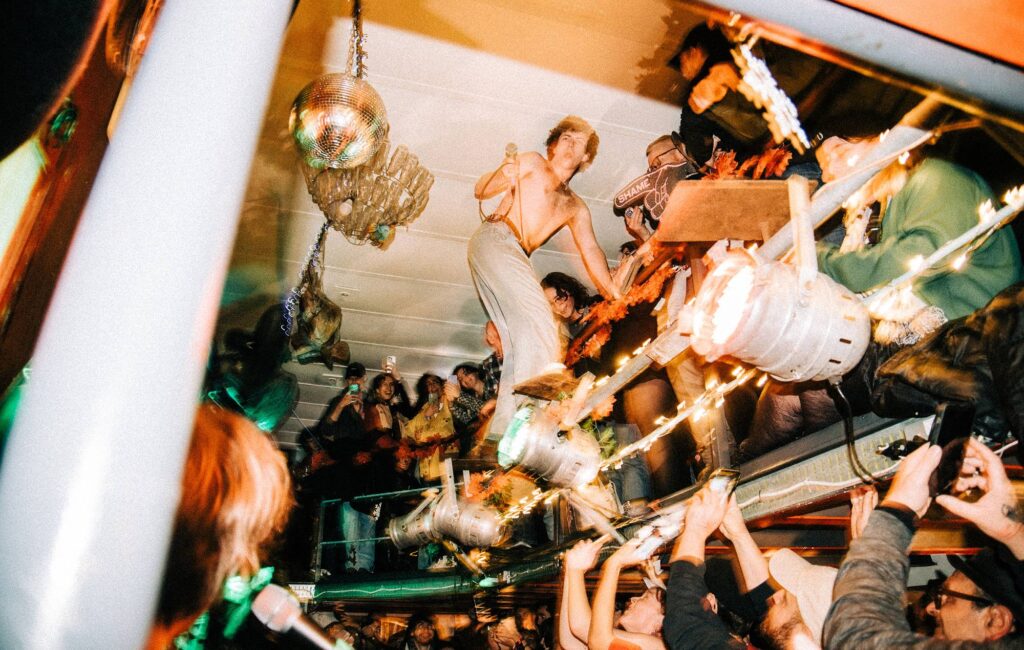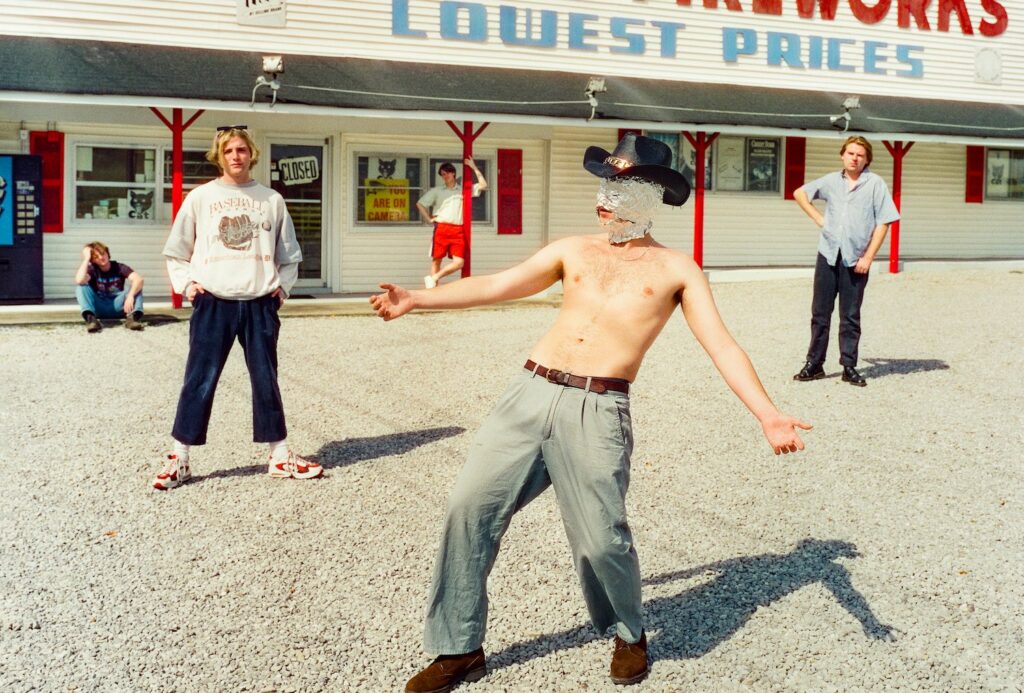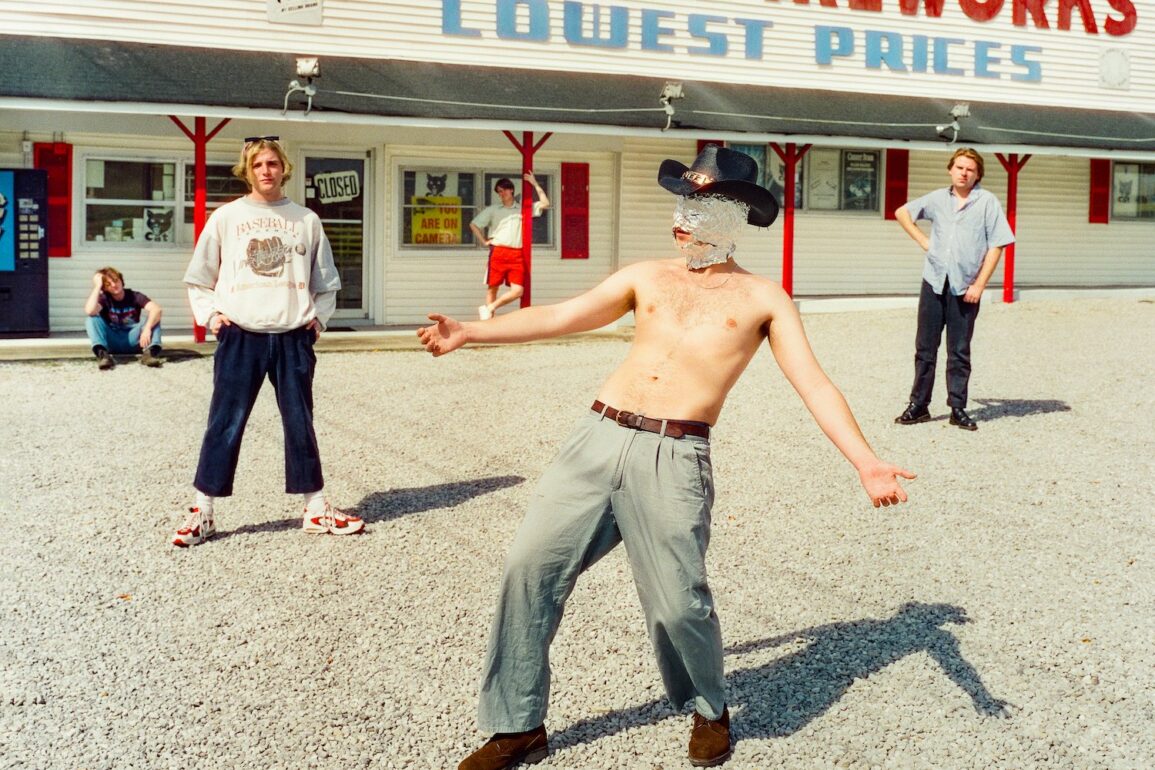We met shame guitarist Sean Coyle-Smith via Zoom way back on the last day of January to talk about the band’s third album, Food For Worms. Then the Kahramanmaras Earthquake tragedy happened, and we postponed all scheduled activity on our site. While the dark days are not over just yet, we can now present to you this interview. Food For Worms is out now.

Nice to meet again after your Istanbul concert last year with black midi.
Sean Coyle-Smith: Yeah! That was wicked, man. I loved Istanbul, too. It was a great city.
It was a crazy night that ended in Taksim.
I remember Geordie (Greep, black midi) being carried home after. He was so drunk. (both laugh) That was a heavy night, my God.
That was also one of my favorite concerts from last year. Hopefully, we’ll see you around here again!
Definitely, it was good for us as well, because we have the same three managers from black midi. So we all came together and had a big family dinner, the whole 22 of us. It was good.
How are you doing, by the way?
I’m good! We are doing tour rehearsals at the moment. I just got back from doing that with the boys. The weather is rubbish here. It’s really cold and gray and gets dark early.
Obviously, we are here to talk about your third album, Food for Worms. Awesome title, by the way.
I was the one who came up with the title, actually. It is a really old English phrase, and I think I read it in… I am not sure whether it was in a history book or in Game of Thrones. (laughs) The phrase is used in the aftermath of a battle to depict the dead. I just liked it as a phrase and don’t think it initially had any particular significance. Obviously, though, you have to come up with a significance, because people will ask about it. I think it’s interesting because there are many ways to look at death. It is a very dark and gloomy topic, but at the same time, there is something very interesting in the recycling of life. You decompose, you get back into the soil… It’s an interesting way to look at it, and for us, it definitely made it easier to look at things in a more positive way. It’s been a crazy few years.
Charlie already described the album as “the Lamborghini of shame records.”
Yeah. Charlie is always saying things like that. (laughs)
How would you like to elaborate on that definition? Or would you define it differently?
Well, he also said that this is our best record and his favorite. I would agree. Whether people will like it or not, we will see. It was also probably the easiest one we have done. It wasn’t like we labored over the songs for a long time, it all came very quickly. I think three months after starting to write them, we were properly in the studio recording them. We didn’t have the time to overcomplicate, overthink or second-guess it. We just went for it. And we are proud of it. Hence the sports car definition. Things worked out quickly with the artwork as well. That’s something we always wanted to do. For the previous two albums, we used photos. We just wanted to have an amazing piece of art. We got in touch with Marcel Dzama, who did the artwork. Listened to the album, and did some sketches and stuff. Immediately, we were like “Yeah! We’ll use that!” (laughs) No spending four months on Zoom meetings or whatnot. It just came together like that.
Here is a little game I picked for you, inspired by the Lamborghini definition: If you were to define each of your three albums so far in single words, which three words would you pick?
Inspired by cars, or…? (laughs)
However you would like.
I think the first one is kind of like the car that your parents buy for you when you go to university or something. The second one, we tried hard on for a couple of years. I don’t know, that’s a tough question. Pass. You need Charlie Steen to answer such a question.
Let’s talk about the physical creation process: You recorded this album live across the festival season. In what ways do you think that approach has grown you as a band and as mates?
It was something we always wanted to do. It was also something all the producers from our first two albums (Dan Foat, Nathan Boddy, James Ford) wanted to do. We just weren’t tight enough. Flood really wanted to do it, and we realized we really wanted to try that this time. It was definitely an experience. We never needed to have that many takes on songs before. The way you normally do it, the bass and drums go in on a click track, they will get a good take, and you get the guitars in individually afterward. Everyone gets time to rest, basically. They are not all in the room at the same time. This time, some songs were quick, and others took 50 to 60 takes. You start pulling your hair, your fingers feel lulled. It was a fun process. It was also the longest we recorded, I think, because we were doing festivals on and off as well. We would record for a week, go away for the weekend, and then come back to the studio. All in all, it took two-and-a-half months or something. It was a madhouse. (both laugh)
Connection and friendship, both through your audiences and within the band, seem to be the two aspects that form this record.
Yeah, definitely. The lyrics from Drunk Tank Pink, from Charlie’s point of view, were really introspective. It was basically him reflecting on the experience of being on tour for four straight years and never being at home. This time around, he had a conversation with one of our friends. His friend told him how there are so many love songs, and how all those emotions you feel in romantic relationships, you also feel in friendships. I think that’s really accurate about Charlie, he draws influence from what he hears from people and what people talk about. I think we always had an interesting friendship growing up together as a band, and with our friends from home as well. He just wanted to write about that, and the whole album ended up being about that in the end.
When working with Flood, did you have a form of music fully present in your mind, or was it more like you just let him do his magic?
With producers, I think it all depends on the person. There are producers who have a more signature sound, and there are producers that just bring out what’s already there. I think Flood is one of those people. His motto is: If it sounds good in a room, and that is how the band likes it, then that’s how we should be doing it in the studio. We had a studio available in East London, where he came down three to four days a week. We played him the songs and the structures. And yeah, he eventually did say: “I want the album to sound like this.” We hadn’t had a producer who said “We’re doing it this way.” Obviously, every producer has their guitar sounds or drum sounds, but Flood is an anything-goes man. If you have an idea, he just says “Okay.” No matter how ridiculous the idea is, he’s like “Yes. Let’s do it.” Interesting process.
So I wanna ask this: When you release this record, who do you think are among some bands or artists that audiences might pinpoint as influences?
I’ll look at this mainly from my perspective and what I contributed. “Fingers of Steel” was an old folk song I had written, years and years ago. We changed it up a little bit, the folk aspect is really strong on this one. But for me overall, the main influence was Jeff Buckley and the Grace album. That is a work I really love, just its songwriting in general, regardless of his amazing vocal performances. Also Radiohead, Bruce Springsteen… Also the 90’s alternative stuff like Mazzy Star, The Jesus and Mary Chain. Those are all big influences for me. Jeff Buckley takes the top spot, though. (laughs)
What do you think were the easiest and hardest songs to make from this record?
(thinks) Oh god, I keep almost calling them by their demo names. There is one called “Burning by Design”, which at first didn’t make it into the album, actually. It came along in a writing retreat with five or six other songs, it was also one of my favorites written during that session, and it came about almost immediately. I pushed for it to be on the album. It was one of the ones we did with five or six takes, we just had it straight away. It was so easy. We also didn’t change much. We didn’t do many overdubs or layering on it really, we just left it as it was. Maybe re-tracked a couple of guitar tracks.
What was the difficult one? There were quite a few difficult ones! (laughs) “Different Person” was quite hard, though. It is one of the longest songs on the record. Structure-wise, it’s kind of similar-ish to “Snow Day” from our last album. It has loads of different sections. It was one of those ones which was really hard to get a good take because we were in the room together and we were playing the song for nearly six minutes. Inevitably, at some point in that performance, someone messes up. It took a lot of takes to get it right. I think we may have eventually patched up a few takes together to make the song. That one’s overdubs were difficult as well, we were trying to fit everything in while also trying to give them space where they can breathe.
I don’t know, the sessions are such a blur now that I look back. It feels like yesterday, but it was in fact five or six months ago.

I want to talk about the image aspect because I feel like that could be an essential aspect of this unique era of shame. In addition to the artwork designed by Marcel Dzama, Charlie shows up in this weird mask in all the promo photos, which seems to be shot at a setting like… I don’t know, Texas?
Yeah! I think it was in Kentucky. Either that or Nashville. By a firework store.
So that was a good guess.
It really was. Pooneh Gana, our amazing photographer, has worked with us for years now. I think she was looking around in that general area on Google Maps, trying to find places. She found this place and said, “We need to go to this firework store!” There were some dodgy white trash characters looking around while we were shooting. (laughs) I was like, “What the f.ck are these guys doing here?”, you know?
So yeah, aesthetic. I think we always wanted to have a campaign that was really related to imagery. Once we received the amazing artwork and found a great photographer, it was really easy. It is an important aspect.
Your expectations from 2023? Where do you imagine yourself as a band by the end of this year?
Obviously, this is going to be our first album campaign tour since our first record. COVID hit right after we finished recording the second one. We never really did a whole year of touring since Songs of Praise. So I think a good year of touring where everyone just enjoys themselves and going to countries we didn’t explore that much are important goals. That’s the meaning. We are also doing some kind of writing at the moment. In the past, we had taken our feet off the gas right around the time an album comes out. This time, we are a bit on a roll. We just want to write an album and get it all out quickly, a year after this one comes out. That’s what I hope for the year. And loads, loads of money! (both laugh)
I think it was in your NME interview that you said your top goal was to be rich this year.
(laughs) Yeah. No. It’s good to have some financial security these days, though. But, you know, as a musician, you’re not in it to make money. You need to head out for the stars. Traveling, doing shows, and meeting new people is the main reward and goal I can think of, really.
What do you think was your proudest moment so far as shame?
I think any time you put out an album, it’s just an amazing thing. It is something that will be around long after we are dead. The music will still be out there. Also doing shows, playing to big crowds, and seeing familiar faces every now and then. I always say there is no bigger cure to feeling rubbish or ill than playing a good show. You could be playing a show soon and dreading it, but once you get out there, the adrenaline kicks in. By the time you finish, it is like… a workout, do you know what I mean? You get off the stage, and you feel this buzz. It’s great, man. Best job in the world! Can’t complain.
I hope Shame is around for many years to come.
We have been around for nearly eight years, actually. That’s wild.
If you had a chance to carve one of your lyrics to your memorial stone 100 years from now, what would you choose?
Wow. I don’t know. That’s a tough one. I really like “I’d rather be f.cked than sad” from “One Rizla.” Charlie wrote it when he was 17, and it is quite a teenage lyric, but I like it. Very much sums up how he was at the time.
You can check out Shame’s Bandcamp page here.



